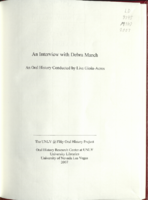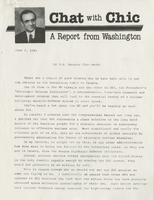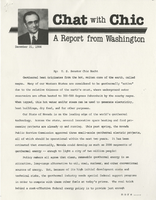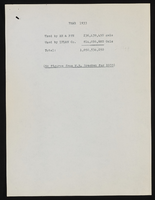Search the Special Collections and Archives Portal
Search Results


Transcript of interview with Debra March by Lisa Gioia-Acres, February 21, 2007
Date
Archival Collection
Description
Text

Transcript of interview with Herbert C. Wells by Dr. David Emerson, March 8, 2006
Date
Archival Collection
Description
Text
Jane Greenspun Gale oral history interview
Identifier
Abstract
Oral history interview with Jane Greenspun Gale conducted by Barbara Tabach on January 31, 2018 and February 09, 2018 for the Southern Nevada Jewish Heritage Project. Gale recalls attending Las Vegas High School, desegregation of schools, and what is was like growing up in Las Vegas, Nevada in the 1960s. Gale then recalls the anti-war position taken by the
Archival Collection
Bernadine Brunson oral history interview
Identifier
Abstract
Oral history interview with Bernadine Brunson conducted by Aaron Louis Koshan on March 02, 2006 for the Public School Principalship Oral History Project. In this interview, Dr. Brunson reflects upon her 33-year career within the Michigan public school system as a teacher and administrator. She describes how following retirement in Michigan, she decided to move to Las Vegas, Nevada. Upon moving to Las Vegas, she became a principal with the Clark County School District, and also taught at the University of Nevada, Las Vegas (UNLV). She discusses the differences between public school systems in Michigan and Nevada, and what she believes are the strengths and weaknesses of both.
Archival Collection
June Eshelman oral history interview
Identifier
Abstract
Oral history interview with June Eshelman conducted by Elizabeth Goodman on March 14, 2003 for the Public School Principalship Oral History Project. In this interview, Eshelman reflects upon her nearly 30-year career as a junior high school music teacher and administrator with the Clark County School District (CCSD) from the 1970s to the early 2000s. She discusses her early experiences as a music teacher and band director, and describes the challenges of transitioning from a teacher to a dean, and eventually principal. She also discusses her experience as a principal working at Gilbert Magnet School, and the different expectations that principals face when working with magnet programs.
Archival Collection
Judy K. Cameron oral history interview
Identifier
Abstract
Oral history interview with Judy K. Cameron conducted by Evan Polili on April 19, 2004 for the Public School Principalship Oral History Project. In this interview, Cameron reflects upon her 30-year career as a teacher and administrator with the Clark County School District (CCSD) from the 1960s to the 1990s. She describes her regular job duties, challenges she faced, and training experiences that she feels were the most beneficial to her career. She also describes her experience as an assistant principal at Bonanza High School, and how the experience prepared her for principalship. She also offers her opinions of the contemporary standing of CCSD, and challenges from overcrowded classrooms.
Archival Collection



